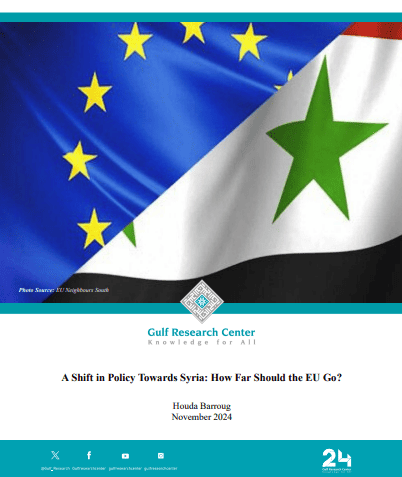Select any text and click on the icon to listen! ByGSpeech
ByGSpeech
 ByGSpeech
ByGSpeech ByGSpeech
ByGSpeech
The EU is at a turning point in its strategy towards Syria, especially as it considers a change to engagement with the Assad government. Discussions over the possible appointment of a special envoy to Syria, which would represent a substantial shift from the EU's long-standing policy of sanctions and diplomatic isolation, highlight this changing approach.
The EU has been among the largest donors to the Syrian crisis, having raised nearly €33 billion in humanitarian aid to people in Syria and across the region. The EU has also taken a strong stand against President Bashar al-Assad's regime from the start of the Syrian civil war in 2011. The EU's approach has been defined by three key tenets: no normalization, no reconstruction, and no sanctions lifting until Syria has undergone a legitimate democratic transition.
Individuals and entities associated with the Assad regime were the primary targets of the EU’s sanctions regime, which aimed to pressure the government to comply with international norms, especially those regarding political reform and human rights. However, as regional dynamics change and Arab states begin to re-engage with Damascus, this strategy has come into question for its efficacy.
May 2023 marked a paradigm shift in approach towards Syria when Assad was welcomed back into the Arab League by Arab leaders who had earlier backed efforts to oust him. With nations like Saudi Arabia and the United Arab Emirates calling for a re-establishment of diplomatic relations with Syria, a significant change in the direction of normalization has been signaled. As a practical strategy that puts stability above accountability, these actions are viewed as measures to stabilize the region and aid with reconstraction efforts.
The normalization effort by Saudi Arabia and the UAE have raised questions about the EU’s position towards Syria- and the prospects and scenarios of any potential change. Gulf countries have pushed for this shift in approach as part of a larger plan to aid reconstruction. This development puts more pressure on the EU to modify its strategy in light of shifting geopolitical conditions.
With the gradually changing regional and global attitude towards Syria, discussions about sending an EU envoy to the country have resurfaced. This might represent an effort by the EU to resume diplomatic relations while continuing to support political change. It is important to note that despite interest in designating a special envoy, EU High Representative Josep Borrell has voiced doubts about a major policy shift due to differing views among member states.
The appointment of the special EU convoy is believed to serve the EU’s broader objectives in the region. A special envoy would help with closing the communication gap between the Assad administration and opposition parties, and promote talks that are necessary for a political settlement in accordance with UN-led proposals. A special envoy would also shoulder the responsibility of monitoring humanitarian aid, ensuring negotiations with the Syrian government regarding its human rights record.
Lastly, the special envoy could help the EU reaffirm its commitment to a constructive engagement strategy while navigating the complex regional dynamics influenced by recent normalization efforts from the Gulf. This will further solidify its role as a key player in conflict resolution. In addition to strengthening diplomatic efforts, this multipronged strategy would assist the EU's strategic goals of not only fostering stability and aiding the Syrian people in the face of continuous unrest but also salvaging its reputation in the region as an active and trust-worthy partner.
For the EU, changing approaches in Saudi Arabia and the UAE provide both opportunities and challenges. Although these nations place a higher priority on stability and Syria's economic recovery, their strategy deviates from the EU's emphasis on democratic reforms and human rights. The Gulf governments seem prepared to handle these concerns in the framework of working with Assad in a practical manner. This discrepancy calls into question how the EU can reconcile its goals with those of regional powers while maintaining its core values.
The evolving dynamics surrounding global engagements with Syria are likely to have significant implications for EU-GCC relations. Gulf nations may anticipate further assistance and collaboration from the EU in areas like commerce, investment, and security as they work toward normalization with Assad. Shared interests in a number of areas, such as energy security and climate change, are highlighted in the recent joint communication on a strategic relationship between the EU and GCC. However, the European bloc's emphasis on accountability and human rights is bound to clash with the Gulf states' more pragmatic approaches to regional stability. Therefore, while there is growing potential for enhanced cooperation between both entities, it will remain crucial to negotiate how to align the blocs’ respective priorities.
In terms of its approach to Syria, the EU is at a turning point. Although it should be handled carefully, the possible appointment of a special envoy offers a chance for renewed engagement. The EU must carefully analyze how to modify its strategy while staying firm in its commitment to democratic values and human rights as regional dynamics change and Arab governments normalize relations with Assad. As Europe negotiates Syria's increasingly complicated geopolitical environment, striking a balance between these interests will be crucial.
*Houda Barroug is a Researcher at the Gulf Research Center (GRC)